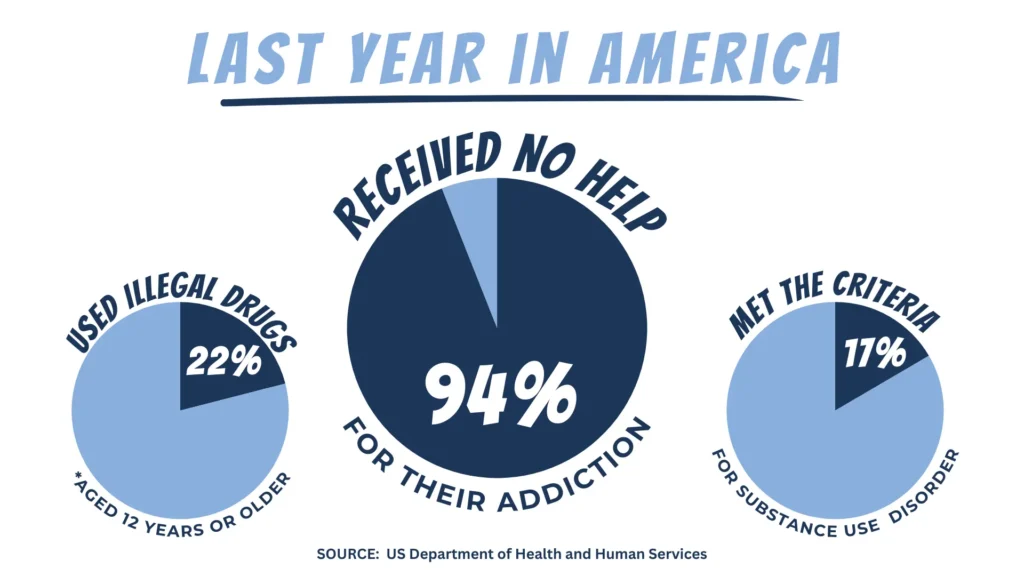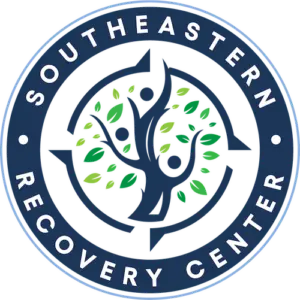Since 1971, the U.S. Department of Health and Human Services’ Substance Abuse and Mental Health Services Administration (SAMHSA) has administered the National Survey on Drug Use and Health (NSDUH). In 2021, the survey found that 46.3 million people (aged 12 years and older) met the DSM-5 criteria for having a substance use disorder – including 29.5 million with alcohol use disorder and 24 million classified with a drug use disorder. 94% of these people reported not receiving any treatment for their alcohol or drug use disorders.

There will be times on your path to sobriety that seem like you can’t do it – you will find yourself struggling to maintain it, but with the right strategy, you can learn how to stay sober long-term. Southeastern Recovery Center understands the struggles, so we have compiled a list of tips to guide you as you learn how to stay sober.
7 Steps on How to Stay Sober from Drugs & Alcohol
Struggling with an addiction to alcohol or drugs and choosing sobriety doesn’t have to be a solo journey. Learning how to stay sober from drugs and alcohol can be achieved, especially when you find a holistic treatment center that individualizes a treatment plan just for you. You can keep making progress toward sobriety by following the seven steps we have put together on how to stay sober from drugs and alcohol.
Step 1: Educate Yourself on Addiction
Sun Tzu said, “know the enemy and know yourself in a hundred battles you will never be in peril.” Understanding that addiction is a disease affecting your mind and body is the first step to beginning your recovery.
To stay sober, you must first acknowledge that you have a problem. By being honest with yourself, learning to identify the symptoms of addiction, and understanding how the disease works – you can begin using coping mechanisms, create a healthier lifestyle, and move past your addiction to drugs or alcohol.

Seeking professional help is crucial to overcoming addiction. Once you have recognized your addiction, reaching out to a therapist, counselor, or addiction treatment specialist can provide you with the tools you need. These professionals can give you the guidance and support that are tailored to your specific needs.
Step 2: Create a Sober Support System
Finding a support network that can offer emotional support, understanding, and encouragement during your sobriety journey is important. This support network can include friends, family, and addiction treatment specialists who understand your goals and are willing to help you achieve them.

Support groups like Alcoholics Anonymous (AA) or Narcotics Anonymous (NA) are safe spaces for recovering addicts. These support groups allow you to share experiences, gain insights, and connect with others who are on the same sobriety journey.
Consider joining support groups like Alcoholics Anonymous (AA) or Narcotics Anonymous (NA). These groups provide a safe space to share experiences, gain insights, and connect with others on a similar journey. Even when you have friends and family supporting you, getting the insight of others who are going through similar experiences can be priceless for your recovery.
Step 3: Develop Healthy Habits to Maintain Sobriety

Taking care of your mind and body can affect your sobriety. Physical activity is a powerful tool in staying sober – exercise releases endorphins, which can boost your mood and reduce cravings. Finding an activity that you enjoy and incorporating it into your daily routine to stay active can help you develop new habits that not only support your sobriety, but also help you live healthier.
Another part of a healthier lifestyle is eating a balanced diet. Proper nutrition can help support your overall well-being, including reducing the risk of relapse. Avoid eating large amounts of junk food and focus on whole foods which are rich in nutrients. The more you focus on your physical and mental well-being, the more motivated you will be to take care of yourself and continue with your sobriety.
Step 4: Manage Triggers and Cravings
According to the National Library of Medicine, addiction disorders are chronic, and studies have shown that more than 85% of people relapse. Most relapse because they fall back into old habits of drug and alcohol use, which is why managing triggers and cravings is imperative for success in maintaining sobriety.
Mindfulness techniques, like meditation and deep breathing exercises, can help you stay grounded and reduce stress. Stress is a huge trigger for recovering addicts, making you turn to the old coping mechanisms – like drugs or alcohol. Mindfulness forces you to live in the present moment and evaluate it, allowing for positive coping strategies to be utilized.

Step 5: Set Goals and Priorities
Setting clear and achievable goals makes it easier to maintain sobriety. If goals are too lofty, they can be overwhelming – increasing stress and making it easier to relapse. Goals come in many shapes and sizes, and may include working on your career, mending relationships, or pursuing new hobbies. The purpose of setting goals that you can achieve is to motivate you to stay on the path of sobriety.
One necessary goal you can make for yourself is prioritizing self-care. It doesn’t have to be hours a day set aside for the activities you love, but spending some time reading, creating art, listening to music, or going out in nature are ways you can bring joy into your life and relax. Taking care of your mental and emotional health is a key component of how to stay sober.

Step 6: Preventing Relapse
Relapses can happen, even if you are undergoing a treatment program – but this doesn’t have to be the end of your sobriety journey. If you experience setbacks, use them as an opportunity to learn and grow. You can’t move forward if you don’t identify what has set you back.

Reaching out for help is not a sign of weakness, it is a sign of strength during recovery. Turn to your support network, therapist, or support group to discuss and process your emotions. They can help provide you with support during this time. They can also help you identify triggers or circumstances that led to the relapse, overcome them, and help you continue your journey.
Step 7: Celebrate Your Successes
Every step of sobriety, no matter how small, is worth celebrating. You have set goals for yourself – achievable goals – and when you achieve them you should be proud of them. Your support system understands how every little achievement is the foundation of long-term sobriety, share these milestones with them.
Once you have maintained sobriety for a while, you might consider giving back to others who are on the same sobriety journey. Sharing your experiences and providing support to others learning how to stay sober is not only rewarding, but it can help you solidify your commitment to staying sober.

Learn How to Stay Sober With Southeastern Recovery Center
Sobriety from drugs and alcohol is a lifelong journey, not just a wrinkle in time. It requires dedication, resilience, and support to maintain. Once you have come to terms with your addiction, it is time to take the next step in learning how to stay sober and Southeastern Recovery Center can help.
We understand that setbacks can occur on your journey, and we aren’t here to judge. Instead, we want to help you overcome them and move forward. Our holistic approach to treatment individualizes addiction treatment, giving you the tools you need to maintain your sobriety long-term. If you or a loved one is struggling with addiction to drugs or alcohol, reach out to Southeastern Recovery Center to learn how to stay sober.





